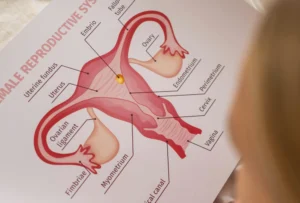Understanding Reactive Oxygen Species and Their Impact on Egg Quality
Reactive oxygen species (ROS) are molecules that contain oxygen and are naturally produced in our bodies.
They are a normal part of how our cells work, especially in the mitochondria, which are like the cell’s power plants. While ROS are important for certain cell functions, too many of them can cause harm by damaging important parts of our cells like DNA, proteins, and fats.
Where Do Reactive Oxygen Species Come From?
ROS are created from several sources, including:
- Cell Energy Production: As cells produce energy, they naturally generate ROS.
- Environment: Pollution, radiation, and certain chemicals can increase ROS levels.
- Lifestyle Choices: Smoking, unhealthy eating, and stress can also lead to higher ROS production.
How Do They Affect Egg Quality?
When there are too many ROS, they can harm egg cells, which are crucial for reproduction. Some of the negative effects include:
- DNA Damage: ROS can break down the DNA in egg cells, leading to problems with the genetic material.
- Energy Issues: They can disrupt the mitochondria, making it harder for the egg cells to get the energy they need to mature properly.
- Cell Damage: ROS can damage the outer layer of egg cells, affecting their health and viability.
These issues can lead to poor-quality embryos, lower chances of fertilization, and a higher risk of miscarriage.

How Glutathione Can Help
Glutathione is a powerful antioxidant that helps protect cells from the damage caused by too many ROS. It’s especially important for keeping egg cells healthy and improving fertility.
Benefits of Glutathione
- Protection Against Damage: Glutathione helps neutralize ROS, reducing the risk of damage to egg cells.
- Better Embryo Quality: Higher levels of glutathione in egg cells are linked to healthier embryos and better chances of fertilization.
- Slowing Aging: As an antioxidant, glutathione may help slow down the aging process of egg cells, which are very sensitive to oxidative damage.
How We Can Help
If you’re dealing with fertility challenges or are considering fertility treatments, taking glutathione might improve the quality of your eggs and increase your chances of a successful pregnancy.
Research shows that glutathione can enhance fertilization rates and may lower the risk of miscarriage. If you’re interested in trying glutathione to boost your egg quality and female fertility, we can prescribe it for you.
This could help reduce the effects of oxidative stress and improve your chances of conceiving.
Please talk to us for more information and to see if this option is right for you.
Author
-

Mike Berkley, LAc, FABORM, is a licensed and board-certified acupuncturist and a board-certified herbalist. He is a fertility specialist at The Berkley Center for Reproductive Wellness in the Midtown East neighborhood of Manhattan, New York.
View all posts